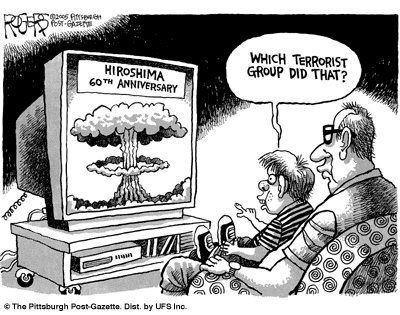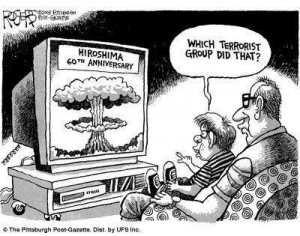OLIVER STONE: … Every school kid — still, my daughter in her school, in private school, in good school, is still learning this: We dropped the bomb because we had to, because the Japanese resistance was fanatic, and we would have lost many American lives taking Japan. This is one — there’s no alternative to that story. —Oliver Stone on the Untold U.S. History from the Atomic Age to Vietnam to Obama’s Drone Wars | Democracy Now!
Here’s the alternative — a part of the truth that should be taught in good, honest, schools:
At 8:16 on the morning of August 6, 1945, the world got a glimpse of its own mortality. At that moment, the city of Hiroshima was obliterated by a fireball that sent waves of searing heat, then a deafening concussion, across the landscape. Three days later, a second bomb hit Nagasaki. … [President Dwight D.] Eisenhower said in 1963 “It wasn’t necessary to hit them with that awful thing.”
… Besides the Manhattan Project’s internal momentum was an external motive. Its leaders had to justify the $2 billion ($26 billion in today’s dollars) expense to Congress and the public… Byrnes…warned Roosevelt that political scandal would follow if it [the atomic bomb] was not used. … “How would you get Congress to appropriate money for atomic energy research [after the war] if you do not show results for the money which has been spent already?” …the U.S. had produced two types of bombs–one using uranium, the other plutonium. Whenever anyone suggested that the moment the bomb was dropped the war would be over, [bureaucrat] Groves countered, “Not until we drop two bombs on Japan.” As [historian] Goldberg explains… “One bomb justified Oak Ridge, the second justified Hanford.” Hiroshima was hit with the uranium bomb, nicknamed “Little Boy”; the plutonium bomb, “Fat Man,” was used against Nagasaki.
From Why We Dropped The Bomb By William Lanouette, CIVILIZATION, The Magazine of the Library of Congress, January/February 1995
It’s hard for Americans who identify with the U.S. Government to accept the idea that that organization could have engaged in such horrendous acts – twice in three days – without pristine motives. Here’s what Vietnam era U.S. Defense Secretary Robert S. McNamara – who was part of Gen. Curtis LeMay’s command when the bombs were dropped – thought about it: McNamara: “He, [General Curtis LeMay] and I’d say I, were behaving as war criminals.”

As far as war criminals go, unfortunately we still have them.




 President Obama’s #apology tour keeps a-rollin’ on, am I right? No, hang on.
President Obama’s #apology tour keeps a-rollin’ on, am I right? No, hang on.